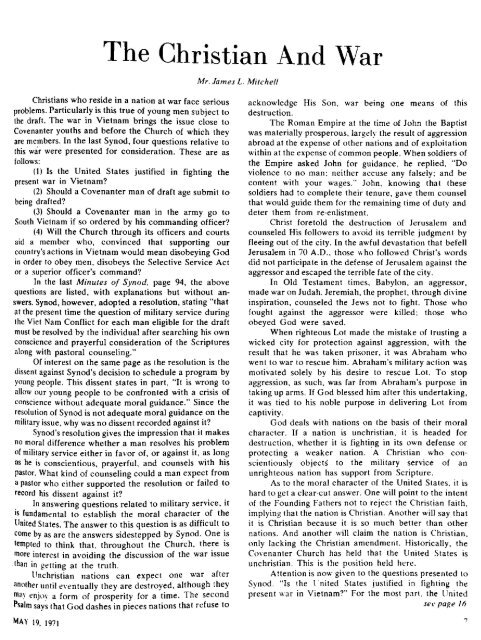Covenanter Witness Vol. 86 - Rparchives.org
Covenanter Witness Vol. 86 - Rparchives.org
Covenanter Witness Vol. 86 - Rparchives.org
You also want an ePaper? Increase the reach of your titles
YUMPU automatically turns print PDFs into web optimized ePapers that Google loves.
The Christian AndMr. James L. MitchellWarChristians who reside in a nation at war face seriousproblems. Particularly is this true of young men subject tothe draft. The war in Vietnam brings the issue close to<strong>Covenanter</strong> youths and before the Church of which theyare members. In the last Synod, four questions relative tothis war were presented for consideration. These are asfollows:(1) Is the United States justified in fighting thepresent war in Vietnam?(2) Should a <strong>Covenanter</strong> man of draft age submit tobeing drafted?(3) Should a <strong>Covenanter</strong> man in the army go toSouth Vietnam if so ordered by his commanding officer?(4) Will the Church through its officers and courtsaid a member who, convinced that supporting ourcountry's actions in Vietnam would mean disobeying Godin order to obey men, disobeys the Selective Service Actor a superior officer's command?In the last Minutes of Synod, page 94, the abovequestions are listed, with explanations but without answers.Synod, however, adopted a resolution, stating "thatat the present time the question of military service duringthe Viet Nam Conflict for each man eligible for the draftmust be resolved by the individual after searching his ownconscience and prayerful consideration of the Scripturesalong with pastoral counseling."Of interest on the same page as the resolution is thedissent against Synod's decision to schedule a program byyoung people. This dissent states in part, "It is wrong toallow our young people to be confronted with a crisis ofconscience without adequate moral guidance." Since theresolution of Synod is not adequate moral guidance on themilitary issue, why was no dissent recorded against it?Synod's resolution gives the impression that it makesno moral difference whether a man resolves his problemof military service either in favor of, or against it, as longas he is conscientious, prayerful, and counsels with hispastor. What kind of counseling could a man expect froma pastor who either supported the resolution or failed torecord his dissent against it?In answering questions related to military service, it•s fundamental to establish the moral character of theUnited States. The answer to this question is as difficult tocome by as are the answers sidestepped by Synod. One istempted to think that, throughout the Church, there ismore interest in avoiding the discussion of the war issuethan in getting at the truth.Unchristian nations can expect one war afteranother until eventually they are destroyed, although theymay enjoy a form of prosperity for a time. The secondPsalm says that God dashes in pieces nations that refuse toacknowledge His Son, war being one means of thisdestruction.The Roman Empire at the time of John the Baptistwas materially prosperous, largely the result of aggressionabroad at the expense of other nations and of exploitationwithin at the expense of common people. When soldiers ofthe Empire asked John for guidance, he replied, "Doviolence to no man; neither accuse any falsely; and becontent with your wages." John, knowing that thesesoldiers had to complete their tenure, gave them counselthat would guide them for the remaining time of duty anddeter them from re-enlistment.Christ foretold the destruction of Jerusalem andcounseled His followers to avoid its terrible judgment byfleeing out of the city. In the awful devastation that befellJerusalem in 70 A.D., those who followed Christ's wordsdid not participate in the defense of Jerusalem against theaggressor and escaped the terrible fate of the city.In Old Testament times, Babylon, an aggressor,made war on Judah. Jeremiah, the prophet, through divineinspiration, counseled the Jews not to fight. Those whofought against the aggressor were killed; those whoobeyed God were saved.When righteous Lot made the mistake of trusting awicked city for protection against aggression, with theresult that he was taken prisoner, it was Abraham whowent to war to rescue him. Abraham's military action wasmotivated solely by his desire to rescue Lot. To stopaggression, as such, was far from Abraham's purpose intaking up arms. If God blessed him after this undertaking,it was tied to his noble purpose in delivering Lot fromcaptivity.God deals with nations on the basis of their moralcharacter. If a nation is unchristian, it is headed fordestruction, whether it is fighting in its own defense orprotecting a weaker nation. A Christian who conscientiouslyobjects' to the military service of anunrighteous nation has support from Scripture.As to the moral character of the United States, it ishard to get a clear-cut answer. One will point to the intentof the Founding Fathers not to reject the Christian faith,implying that the nation is Christian. Another will say thatit is Christian because it is so much better than othernations. And another will claim the nation is Christian,only lacking the Christian amendment. Historically, the<strong>Covenanter</strong> Church has held that the United States isunchristian. This is the position held here.Attention is now given to the questions presented toSvnod. "Is the I nited States justified in fighting thepresent war in Vietnam?" For the most part, the Unitedsee page 16MA V 19, 1971
















